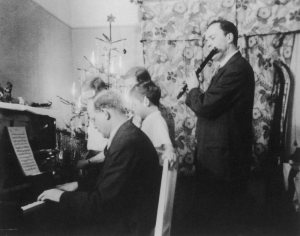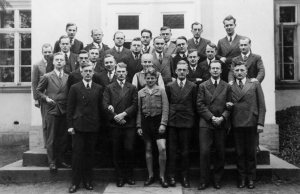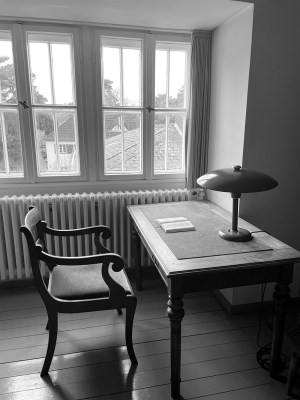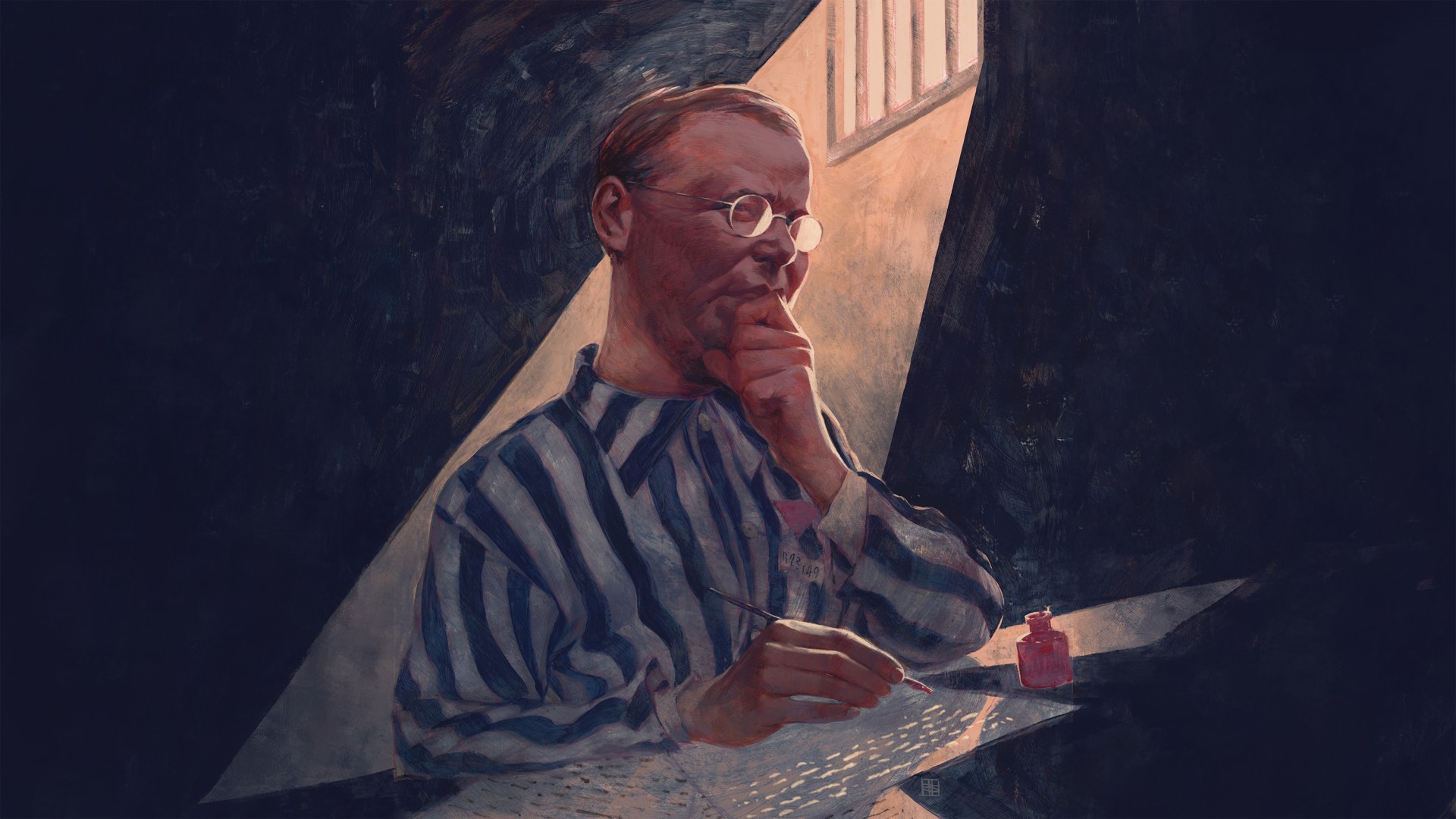“When Christ calls a man, he bids him come and die.”
“A Christian’s secular vocation receives new recognition from the gospel only to the extent that it is carried on while following Jesus.”
You may have heard these calls to a radical Christian life before, as well as other quotations from Dietrich Bonhoeffer. Bonhoeffer is one of the most-quoted Christian theologians of the last 100 years, inspiring generations of believers. What you may not have heard is that Bonhoeffer spent his final months in Tegel Prison creating art.
Bonhoeffer was arrested by the Gestapo at his parents’ home in Charlottenburg, Germany, in April 1943. He had broken many German laws by helping Jewish neighbors and by using his position as a government intelligence officer to evade service in the Nazi army. Bonhoeffer was jailed until October 1944 at Tegel Prison north of Berlin in relative comfort, allowing him the time and space to read and write prolifically for most of his imprisonment.
After his participation in the now-famous Hitler assassination plot was exposed, Bonhoeffer was convicted of new crimes and was moved from Tegel to Prinz-Albrecht-Strasse, then to Buchenwald concentration camp, and finally to Flossenbürg, where he was hanged with six others on April 9, 1945, just one month before Germany’s surrender to the Allied forces. Bonhoeffer’s short life came to a premature end.
A question haunts us: Did Bonhoeffer waste the last months of his life in prison by spending time on creative writing instead of finishing his best book, the much-anticipated Ethics? The Bible invites us to “number our days” (Ps. 90:12) and warns, “You are a mist that appears for a little while and then vanishes” (James 4:14). The haunting brevity of life, pictured in the Bible and illustrated in the lives of many like Bonhoeffer, raises more questions than it answers about how we spend our time.
Hardly any of us know the final result of our daily choices. And while many readers of Christian-living bestsellers love Bonhoeffer’s wisdom about true satisfaction in The Cost of Discipleship and Life Together, we can only guess at how the theologian would evaluate his own life or his last days. Did he make the right choices?
Devotees may have read Letters and Papers from Prison and reasonably supposed that theology was Bonhoeffer’s primary preoccupation in his final days. What most don’t know, however, was that Bonhoeffer spent just as much time in prison writing poetry, working on a play, and starting a novel.
His poetry explored spirituality. His most famous poem, Who Am I? (Wer bin ich?), raises existential questions and answers them with an emphatic “O God, I am thine!”
 Courtesy of dietrich-bonhoeffer.net
Courtesy of dietrich-bonhoeffer.netBonhoeffer also began writing a play, then turned its content into a novel. Both focused on middle-class characters and themes of life and death, family, and everyday life set against a backdrop of war. He used the projects to examine work, rest, worship, and the implications of their interplay in every person’s life.
According to Bonhoeffer, in a letter to Eberhard Bethge, there would be a mayor, a teacher, a pastor, a doctor, and an engineer. These characters all correlate to spheres of culture where the Christian life as lived out in Germany after the war would have to be reimagined. How would a kindergarten teacher teach in a classroom previously adorned with Nazi flags? How would doctors and pastors carry out their roles in a community so devastated by death and grief when Germany was defeated? These kinds of questions drove Bonhoeffer’s fiction, but they are clear in Letters and Papers and Ethics as well.
Many of Bonhoeffer’s family members believed these fictional works were autobiographical and pointed toward the struggles he had in trying to live out a beautiful life in such contrastingly ugly times.
But how could he choose such “frivolous” endeavors when his major work was unfinished?
Bonhoeffer began writing his magnum opus Ethics in 1940. He would likely have finished it had he not been arrested in 1943, as he had made substantial progress. He had also communicated to his friend Bethge his vision for the direction he would take to complete Ethics, which is why Bethge was entrusted to publish what we have available today.
By all accounts, this was the book the world was waiting for from Dietrich Bonhoeffer. Ethics was the culmination of ideas stretching back to his earliest writings, a synthesis of major themes he had approached but never fully addressed, such as ecclesiology, divine and natural revelation, and the sociology of religion. Yet in 1943, Bonhoeffer chose his art. Was it irresponsible to neglect such a book to spend time in self-expression?
It is unfair, even if useful, to reduce historical figures to their most well-known achievements. Theologians are, like all historical figures, rarely as one-dimensional as we might imagine. History is always more complex than a caricature. This is the case with Bonhoeffer.
None of us is only a theologian or pastor, any more than anyone is only a farmer, a graphic designer, a cab driver, a bond trader, or a social media influencer. In a global culture that overemphasizes individual identity, we somehow forfeit the complex beauty embedded in God’s creative masterpiece: humanity. By reducing people to just one thing, we denigrate the beautiful and varied multitudes we each contain.
When we treat historical figures as just one thing, everybody loses. People remember Winston Churchill for his political leadership but rarely for his paintings. Thomas Merton is more often heralded for The Seven Storey Mountain than for his photography.
And while Christians might remember Bonhoeffer first as a theologian or for his association with a failed assassination plot against Adolf Hitler, we wonder if there is any room to remember him as a gifted artist with grand visions but too little time to pursue them. Not surprisingly, Bonhoeffer’s commentators consume his art mostly for its historical or theological value. It would be harsh to judge the artistic merit of these creative ventures on their own terms; though Bonhoeffer was a world-class theologian, he was not a world-class artist. Why would anyone take a theologian seriously as an artist anyway?
What scholars don’t seem to be asking is whether Bonhoeffer was harboring deep regret about the course of his life. He must have felt his talents were wasted in that jail cell. Had he, in fact, chosen the wrong life—one that led him to prison and regret? Today’s readers can surely relate. From time to time, most of us ask the same agonizing questions. Have I chosen the right path? Is this the meaningful life I was looking for? These are questions Bonhoeffer wrestled with.
A different path seemed possible. Before his homeland transformed into the Nazi Germany of popular memory, young Dietrich had an opportunity at a normal childhood.
He was one of eight children (including his twin sister, Sabine) born to Karl and Paula Bonhoeffer in what was then Breslau, Germany, in 1906. When he was six, his family moved to Berlin, where his father served as a university professor of psychology.
One example of his early artistic bent is his piano lessons. Dietrich excelled beyond expectation. According to Bethge, both his best friend and principal biographer, his sense of rivalry with his seven siblings drove him to surpass them in musical ability. In fact, his parents thought he was so unusually gifted that he might become a professional classical musician.
We know he prioritized music throughout his life. Bonhoeffer’s love of it is everywhere in the remembrances of friends and in photographs of him providing accompaniment with piano or guitar. He loved all kinds of music. He collected records of Black spirituals in Harlem as a postdoctoral student in 1930 and 1931 and attended a performance of Don Giovanni after he sprang a former student from prison in Germany.
As Bonhoeffer’s former student Johannes Goebel recalled in “When He Sat Down at the Piano,”
While he was sitting at the piano something which I had not known in him and have never seen again, an expression of natural force, of something primeval, came over him, a Dietrich different from the one known to us. It was not just his natural freshness, his energy, his will-power. … I do not, unfortunately, remember the musical style of his improvisation, probably because it fascinated me more to witness the native human quality breaking through his personality, than to pay attention to his music. And suddenly he stopped as abruptly as he had begun.
Music was also there for him at the end of his life. In his letters from prison, he often spoke of music—his desire to enjoy it, play it, and learn more—when he indulged his hopes of liberation. In a June 14, 1943, letter, he wrote, “Being able to make music with [friends and family] again will be one of the most special moments after I am released.” This hope would come and go until the end.
 Courtesy of dietrich-bonhoeffer.net
Courtesy of dietrich-bonhoeffer.netIn a letter almost a year later, Bonhoeffer returned to his knowledge of music to illustrate how the Christian life should be lived faithfully amid many competing demands. In that letter, he described this array of demands as the “polyphony of life.”
How can we navigate such a potentially cacophonous array of voices? Bonhoeffer employs another musical term: cantus firmus, which is the melodic basis for a polyphonic composition. Just as the cantus firmus provides the grounding musical theme to which all other melodies must orient themselves, so also one’s love for God orients every other commitment in one’s life.
Then, not unlike the complexities of symphonic composition, there can be a clear meaning among so many diverse expressions. Bonhoeffer explained, “Only this polyphony gives your life wholeness, and you know that no disaster can befall you as long as the cantus firmus continues.” We must remember that things seemed utterly disastrous for him at the time of this letter, so we can be grateful that his love of music gave him hope amid the worst.
Perhaps Bonhoeffer should have chosen music earlier in life. He certainly loved it, and music gave him so much.
In his parents’ Charlottenburg home, now a preserved historical site, visitors can view Bonhoeffer’s desk and recall the important works drafted there , including parts of Ethics. Next to that prodigious desk sits a small clavichord piano. Perhaps their side-by-side preservation in the Bonhoeffer home speaks to the harmony of theology and music in his life.
Although Bonhoeffer’s artistic foundation was in music, his creative preoccupations in prison were not musical; they were literary. Bonhoeffer was shaped profoundly by his journeys as a voracious reader.
Apparently, his literary appetites remained with him to the end, because the list of literature mentioned in his prison correspondence includes not only Barth, Bultmann, and Harnack but also Dante, Dostoyevsky, and Goethe. When Bonhoeffer wrote to his parents, he reflected at length on what fiction he was reading alongside his requests for theology texts.
These great works spoke to the plight of his own time. In a letter dated February 21, 1944, Bonhoeffer compared the efforts of the German church’s struggle to that of Don Quixote, a work that troubled him. It is telling that literary figures came to mind, rather than allusions to the Bible or the life of Martin Luther.
Amid the stifling isolation of prison, Bonhoeffer found friends and comrades on the literary page. His mind hosted a diverse salon of writers each night in his dark, quiet cell. Perhaps it is not surprising to witness his own earnest attempt to join them.
Bonhoeffer wrote nonfiction in prison, too, of course. Many know of his prolific efforts in academic theology, his many sermon manuscripts, and his important contributions to ecumenical statements and confessions, such as the Barmen Declaration, the After Ten Years letter, and more.
Under the heading “Literary Attempts,” biographer Bethge assesses his friend’s efforts. Interestingly, Bonhoeffer’s friend saw them as quite a natural turn. Such creative endeavors were both a source of joy and a means of hopefully overcoming his sense of isolation. But despite his admiration of masterful playwrights and novelists, Bonhoeffer’s emulations could not escape the trappings of contrivance, and his characters’ soliloquies registered as too thinly veiled for even their author.
While his grander ambitions led to artistic dead ends, Bonhoeffer found more success—and likely more consolation—in writing poetry. Bethge indicates that simple verse proved more direct and better suited to the angst and longing that burdened him. We find such a picture in lines like these from Who Am I?:
Am I really what others say of me?
Or am I only what I know of myself?
Restless, yearning, sick, like a caged bird,
struggling for life breath, as if I were being strangled,
starving for colors, for flowers, for birdsong,
thirsting for kind words, human closeness,
shaking with rage at power lust and pettiest insult,
tossed about, waiting for great things to happen,
helplessly fearing for friends so far away,
too tired and empty to pray, to think, to work,
weary and ready to take my leave of it all?
… Who am I? They mock me, these lonely questions of mine.
Whoever I am, thou knowest me, O God, I am thine!
While much of the poetic texture may have been sacrificed in translation, the most poignant content remains. Poems like The Past, Sorrow and Joy, and Stations on the Way to Freedom were intended for his family, friends, and himself, yet we benefit from his laments all the same.
Bonhoeffer’s letters from prison provide readers with otherwise rare insight into his mind during a constrained time frame. It is certainly possible that Bonhoeffer spent time in his working years on creative pursuits that have gone undocumented. But it is hard to imagine, given his documented travels and various demanding responsibilities, that Bonhoeffer devoted much, if any, time to the focused creative efforts he turned to in prison. Did the prison walls help Bonhoeffer finally unlock the creative life that was always trying to be free?
Perhaps now we can imagine that his internal dialogues with Jesus and Jeremiah, Luther and Barth, included Goethe and Mozart too. We must allow that the same imagination that crafted The Cost of Discipleship from meditations on the Sermon on the Mount also crafted the aching lines of poetry above.
Rather than just a welcome distraction during his imprisonment, these pursuits can be traced back to the burgeoning creativity of young Dietrich and can be seen in almost every season of his short life.
Let us return to the fascinating account from Bonhoeffer’s former student Goebel. He learned something profound about his friend that fateful night:
I was interested in his playing perhaps more than he thought agreeable or important. I asked him whether he had ever tried, or was trying, to compose anything. In a distinctly reserved tone he said he had stopped doing so since he had become a theologian, or something to the effect. This seems to me a typical trait of his nature. Bonhoeffer was a passionate preacher and theologian, as Bethge confirms. To sit down at an instrument and improvise or even compose—and not just play Mozart with exactitude … this can only be done in passion, and out of passion. Bonhoeffer cast this passion out of his life for the sake of the call to a greater “passion.” This too is a contribution to the theme of “Call and Discipleship.” Bonhoeffer studies have always struggled to sort through the many versions of Bonhoeffer in popular discourse. The portraits range from conservative to liberal, hero to everyman. Holocaust scholar Victoria Barnett warned on the 70th anniversary of Bonhoeffer’s killing that “popular hagiography has lifted him far beyond [the] historical record.” Biography and theology are so naturally connected in his case that theological analysis of Bonhoeffer’s writing is nearly impossible without understanding his personal narrative. In light of these narratives, we see that what we have gained from his public witness came at the cost of his personal dreams.
What he wrote in those poems matters for us, but arguably why he wrote them matters a great deal more. What appears to us as such a curious choice must have been a desperate attempt to hang on to his own humanity. In the midst of threatening death, creativity allowed him some recovery of his most authentic self.
Here, we must let the man interpret himself. In a letter from January 23, 1944, Bonhoeffer puts creaturely goods, such as one’s love of the arts, friendships, and even play, in the context of Christian freedom. He wonders, “Who in our time could, for example, lightheartedly make music, nurture friendship, play, and be happy? Certainly not the ‘ethical’ person, but only the Christian.”
In other words, only the Christian life possesses the generative freedom to pursue such joyous things as they were intended by God. Like friendship or play, creative expression has the power to attune the human soul to a divine frequency. They are not necessary to be a “good” person but are likely required for what Bonhoeffer calls “full human being.”
Nor does such creativity have to be museum- worthy. Conventional artistic achievement is not the only standard by which Christians might judge a poem, a play, a novel, or a painting. Making—creating and imitating the Creator—is a form of discipleship. We “follow after” God when we make anything. Art is a spiritual discipline as much as it is anything else.
We experience such fullness amid the glorious overflow of human creativity all around us. Beauty is undeniable but far from automatic; we cause it to flourish when we heed the creative call of God.
So, like we read in Bonhoeffer’s poems—and like Goebel saw in his improvisations at the piano—creative expression is our life-giving cry of freedom. When his life was most threatened, his indelible humanity, touched by Christ’s restorative grace, found an unlikely way to shine through.
Maybe such joys are less a privilege of leisure and more the affirmation of the grave-denying power of God at work within us.
 Courtesy of Devin Maddox
Courtesy of Devin MaddoxHuman beings—all of us—were made to create. Somewhere along the way, many of us received the destructive message that artistry is simply a waste of time, especially when there are tradeoffs with more clearly practical endeavors. We’ve heard rebukes like “How will you make a living from that?” and “What’s the point if you aren’t going to be the best at it?” Some of us have even heard these messages in the churches we’ve attended.
Poignantly, many of us were confronted with our own regrets and questions during the long days of pandemic lockdown that started in 2020. Such doubts must certainly have played a part in “The Great Resignation” and are still hard to get away from. As many, including pastors, wonder whether to quit, we also wonder how many might have survived the burnout epidemic if their churches had had a richer vision of what sustains whole persons—the freedom to create.
Bonhoeffer didn’t waste his life, nor did he rob the world of something good. Let the last days of Bonhoeffer’s life serve as a witness to how crude, shortsighted, and false such messages are.
His life shows an abiding love of the arts. We must remember what Bonhoeffer teaches us from within those prison walls: “If the Son sets you free, you will be free indeed ” (John 8:36).
So whether we find ourselves desperately scratching out verses behind prison bars or simply carving out a space for some playful creativity in our harried, overproductive lives, we must never let go of our creative impulse. It’s ours by virtue of the Creator’s image. It’s why we garden, labor over grand meals, and write beautiful thank-you notes. We can’t help it; it’s in our nature.
Bonhoeffer shows us that we can’t stop at mere appreciation for the creativity of others; we are instead compelled by our common humanity to participate.
In other words, it’s time to pick up the pen or the paintbrush or the sheet music again. If an imprisoned theologian can do it, there’s hope for burned-out church leaders, fatigued parents, and desperately busy workers like us.
Devin Maddox is books publisher at B&H Publishing Group and lives with his family of five in Middle Tennessee. Taylor Worley is visiting associate professor of art history at Wheaton College and the author of Memento Mori in Contemporary Art: Theologies of Lament and Hope.















